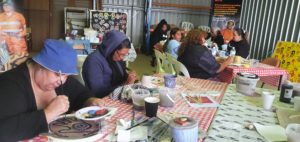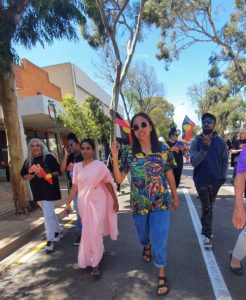Prospering after prison
News
One of the key principles at Mercy Works is to walk with vulnerable people, to empower them to take responsibility for their lives and become their own agents of change.

Mercy Works’ Prospering After Prison pilot project, based in Port Augusta, is a partnership with Centacare Catholic Country and has been running for two years, providing holistic care for Aboriginal women leaving prison to enable them to prosper in their community.
In the past year, 21 Aboriginal women were assisted in the development of personal and financial resilience, living skills, cultural healing, spiritual support and community connection under the guiding and dedicated care of three Sisters of Saint Anne of Chennai: Sisters Delma Rani, Elizabeth Royan and Sheela Thomas.
Advertisement
 They accompanied women to their court hearings when they were released on parole, connected them with legal aid, transported them to locations to access service and referrals for emergency housing, food and clothing as well as visited inmates in prison. They also delivered food packages in the APY lands during COVID and provided basic amenities packs upon their release.
They accompanied women to their court hearings when they were released on parole, connected them with legal aid, transported them to locations to access service and referrals for emergency housing, food and clothing as well as visited inmates in prison. They also delivered food packages in the APY lands during COVID and provided basic amenities packs upon their release.
The team has worked tirelessly to empower and strengthen the families and communities of these vulnerable women, many of whom are dealing with alcohol and drug addiction, homelessness, prior traumas, poverty and domestic violence.
The projects were aimed at improving the capacity and connectedness of women leaving prison when they are vulnerable and at risk of re-offending due to the barriers of navigating through the transition from prison to everyday life in their community.
The need for tailored projects that meet the individual needs of offenders’ is currently not being met by services in the region.
“Women whose husbands or partners are incarcerated should be supported,” said Sr Sheela, adding that a wide range of women were targeted in the program.
Advertisement
“Women suffer greatly on a mental, economic and emotional level. By assisting them, we are supporting the entire family and ensuring productive and integrative living.”
 The Sisters’ hard work, monitoring and evaluation has the potential to be incorporated into advocacy for ongoing funding for a range of providers, including State and Commonwealth governments.
The Sisters’ hard work, monitoring and evaluation has the potential to be incorporated into advocacy for ongoing funding for a range of providers, including State and Commonwealth governments.
The pilot will provide the evidence base to evaluate areas for expansion within the project and on a larger scale. Both Sr Delma and Sr Sheela have been appointed by the prison to be volunteer chaplains.
“We hope the information and documentation we have acquired will encourage us in engaging the support of other stakeholders in this project,” Sr Sheela said.
“We recognise their present predicament, which is the result of multiple underlying issues in their lives including intergenerational trauma.
“After listening, we discovered how their sharing of their trauma had such an impact on us.”
Dr Jen Clearly, CEO of Centacare Catholic Country SA, said there was minimal or no preparation within the prison prior to release, and no services available in the community upon release.
For this reason she has contacted Kornar Winmil Yunti Aboriginal Corporation (KWY), which has expressed interest in expanding its involvement with the Sisters.
She has also had contact with the Kokatha Aboriginal Corporation with a view to involving Centacare in the future, should funding become available.
First published in Bilum Magazine.







Comments
Show comments Hide comments